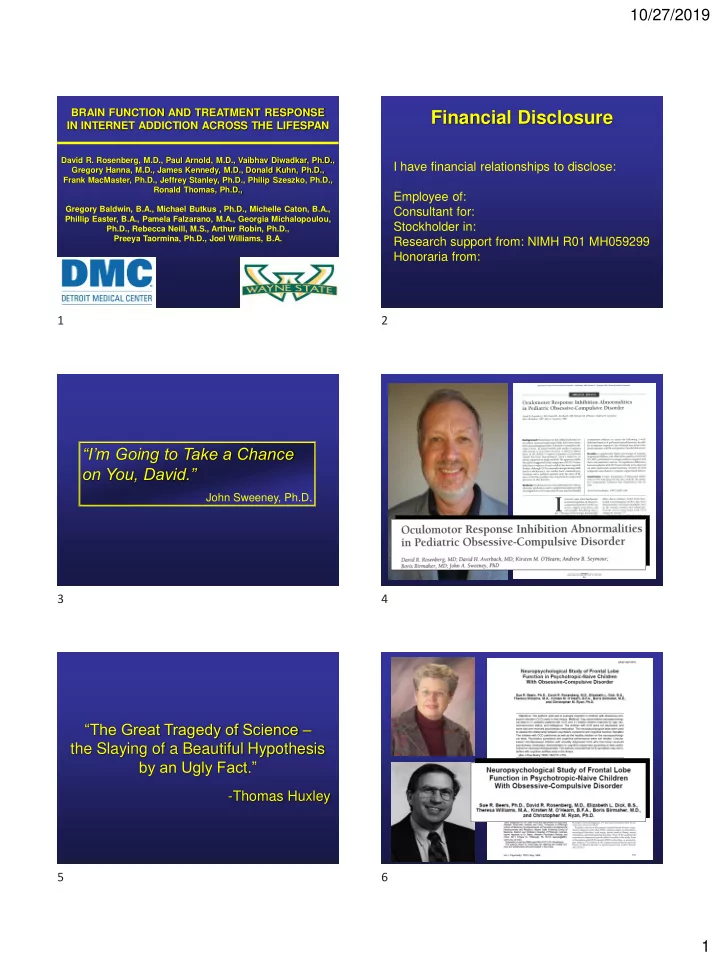

10/27/2019 BRAIN FUNCTION AND TREATMENT RESPONSE Financial Disclosure IN INTERNET ADDICTION ACROSS THE LIFESPAN David R. Rosenberg, M.D., Paul Arnold, M.D., Vaibhav Diwadkar, Ph.D., I have financial relationships to disclose: Gregory Hanna, M.D., James Kennedy, M.D., Donald Kuhn, Ph.D., Frank MacMaster, Ph.D., Jeffrey Stanley, Ph.D., Philip Szeszko, Ph.D., Ronald Thomas, Ph.D., Employee of: Gregory Baldwin, B.A., Michael Butkus , Ph.D., Michelle Caton, B.A., Consultant for: Phillip Easter, B.A., Pamela Falzarano, M.A., Georgia Michalopoulou, Stockholder in: Ph.D., Rebecca Neill, M.S., Arthur Robin, Ph.D., Preeya Taormina, Ph.D., Joel Williams, B.A. Research support from: NIMH R01 MH059299 Honoraria from: 1 2 “I’m Going to Take a Chance on You, David.” John Sweeney, Ph.D. 3 4 “The Great Tragedy of Science – the Slaying of a Beautiful Hypothesis by an Ugly Fact.” -Thomas Huxley 5 6 1
10/27/2019 “Chance Favors the Prepared Mind.” - Louis Pasteur 7 8 Internet Use Disorder THE INTERNET IS A • Typically Devote 8-10 Hours or More WONDERFUL SERVANT per Day and at Least 30 Hours per Week BUT A CRUEL AND • Can Go for Long Periods without Food or Sleep CRIPPLING MASTER • Medical Complications e.g. Back/Eye Pain, Obesity/Weight Gain 9 10 11 12 2
10/27/2019 Internet Gaming Disorder (IGD) - Condition Proposed for Further Study DSM-5 13 14 Proposed Criteria for IGD RELATED DISORDERS • Persistent and Recurrent Use of the Internet Leading to Clinically Significant Impairment in a 12 Month Period • Excessive Gambling On Line may Qualify • Preoccupation with Internet Game for a Separate Diagnosis of Gambling • Withdrawal Symptoms when Taken Away Disorder • Tolerance - Need to Spend Increasing Amount of Time • Unsuccessful Attempts to Control Participation • Excessive Use of Internet not Involving • Loss of Interest in Previous Hobbies and Entertainment Playing Online Games is Not Considered • Continued Use Despite Psychosocial Problems Analogous to Internet Gaming Disorder • Use of Internet to Escape or Relieve Negative Mood • Jeopardized or Lost a Significant Relationship, Job, Educational or Career Opportunity 15 16 SUBTYPES • Impulse Control Subtype ALWAYS AN • Obsessive-Compulsive Subtype UNDERLYING DISORDER • Depressed/Anxious Subtype • Combined Impulse Control and Obsessive-Compulsive Subtype 17 18 3
10/27/2019 PREVALENCE RISKS AND PROGNOSIS • Appears to be Highest in Asian • Access and Availability Countries and Male Adolescents, 12-20 Years of Age • Adolescent Males at Greatest Risk but Increasing Across the Lifespan • Many Reports from China and South Korea, Fewer from North America and • Speculated that Asian Europe Environmental and/or Genetic • Prevalence Reported to be up to 8.4% Background may be Risk Factor for Males and 4.5% for Females 19 20 INTERNET ADDICTION TEST (IAT) CONSEQUENCES OF *SCORES 40 OR HIGHER ARE PROBLEMATIC* INTERNET ADDICTION • School Failure • Loss of Jobs • Marriage and Relationship Failure • Adverse Impact on Healthy Social, Educational, and Family Activities 21 22 Brain Structures Central to Internet Addiction Functional MRI Tasks Parietal Anterior Dorsolateral Cortex Prefrontal Cingulate Striatum: Cortex Thalamus Putamen • Right and Left Hand Finger Tapping Caudate • Number Matching • 1n-back Letter Matching Thalamus • 2n-back Letter Matching Dorsolateral Nucleus Accumbens Anterior Prefrontal Cingulate Cortex 23 24 4
10/27/2019 Internet Addiction – Baseline fMRI Healthy Control – Baseline fMRI Internet Addiction – Baseline fMRI Internet Addiction – Follow-Up fMRI 25 26 Internet Addiction – Follow-Up fMRI Internet Addiction – Post-Relapse fMRI PRELIMINARY CONCLUSIONS • Internet Use Disorder has Significant Public Health Importance • May be Harder to "Unplug" and Escape the Internet than Other Addictions • Critical Brain Alterations may be Associated with Internet Addiction • Growing Public Health Concern Requiring Societal Attention and Intervention 27 28 QUESTIONS AND THANK YOU! COMMENTS 29 30 5
Recommend
More recommend